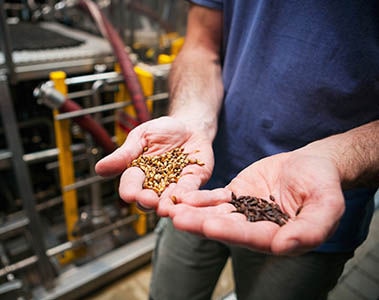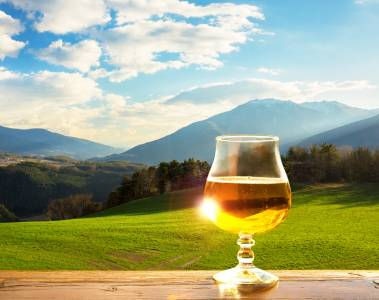
News
5월 5, 2022
효소 솔루션의 도움으로 더욱 지속 가능한 맥주 양조하기

It’s no longer enough to talk about sustainability; the time has come to put words into action. In the brewing industry, some of the largest companies in the business are putting a firm stake in the ground and committing to ambitious planet targets. How achievable are they?
Driving change in any industry requires a critical mass of good intention and meaningful action. As climate change comes to the forefront of the public agenda, it’s clear that market success and long-term viability for any business will depend on building more sustainable operations. That’s because today’s conscious consumers are mindful of the environmental impact of the products they purchase, and the power they have to create a greener future through their choices.
It’s no longer enough to talk about sustainability; the time has come to put words into action. In the brewing industry, some of the largest companies in the business are putting a firm stake in the ground and committing to ambitious planet targets. How achievable are they?
Driving change in any industry requires a critical mass of good intention and meaningful action. As climate change comes to the forefront of the public agenda, it’s clear that market success and long-term viability for any business will depend on building more sustainable operations. That’s because today’s conscious consumers are mindful of the environmental impact of the products they purchase, and the power they have to create a greener future through their choices.
Brewing Industry sets bold targets as course for action
The brewing industry is taking note, and leading players are making clear commitments to embrace sustainability throughout their operations. Just recently, Diageo launched a 10-year sustainability action plan with ambitious targets that align to the United Nations Sustainable Development Goals (SDGs). Among their plan’s three focus areas is ‘pioneering grain-to-glass sustainability’, and the company is setting goals to achieve net zero carbon emissions from direct operations and to use 30% less water in every drink it produces by 20301. Carlsberg have also set ambitious science-based targets to reach ZERO emissions from their breweries by 2030, read in detail about their sustainability roadmap here.
ABInBev has similarly aligned to the SDGs and committed to its own 2025 Sustainability Goals that include getting 100% of purchased electricity from renewable sources2.
HEINEKEN announced its 2030 Brew a Better World programme, a set of ambitious commitments aimed at driving a positive impact on the environment, social sustainability and the responsible consumption of alcohol, as part of their efforts towards net zero carbon by 2030.

Innovative enzyme solutions put sustainability targets in reach
“The momentum within the brewing industry toward sustainable operations, and the commitment from many global breweries to take real action to get there, is both compelling and really exciting for all of us,” says Joana Carneiro, Business Director Beverages, dsm-firmenich Food Specialties.
“As a partner to breweries around the world, dsm-firmenich is responding in kind with a broadening portfolio of brewing enzymes that will help brewers produce a more sustainable glass of beer that tastes great and begs another sip.”
As an example, dsm-firmenich recently added Maxadjunct™ ß L, a high-performance adjunct brewing enzyme, to its enzyme portfolio. The choice of raw material can have a significant impact on overall efficiency, energy usage and cost. Thus, brewers invested in more sustainable production can increase the use of adjuncts, such as rice, maize and cassava, to help reduce the amount of malt in their recipes. The malting process for barley is quite energy- and water-intensive, so using less of it and increasing the ratio of adjuncts can have a big impact on reducing CO2 emissions.
Maxadjunct™ ß L gives brewers the flexibility to use a wide variety of raw materials (even up to 100% adjuncts) and deliver the same great-tasting beer. An added benefit is that adjuncts are often sourced locally, which further contributes to a circular economy in the region and a lower carbon footprint.

Results that make a difference
Enzymes are naturally sustainable, simple to use and can be added to different stages of brewers’ existing production processes, depending on the application and intended effect. Right now our Brewer’s Clarex® has been in the market for more than 10 years and is a proven technology with an average of 1 per 4 bottles in beer production being brewed with it to support a variety of sustainability targets globally . It’s a unique liquid enzyme added to the fermentation stage that streamlines beer stabilization by eliminating the deep cooling and rinsing step.

This reduced maturation time (by one day) can enable brewers to cut their carbon footprint by 5-6%, reduce water use by 1% and reach energy cost savings up to €70,000 per 1 million hectoliters of beer produced. In fact, if all the beer in Europe was made with Brewers Clarex®, the energy saved (327 KWH) would equal €30 million in cost savings and 52,000 fewer cars on the road for one year!
Brewers Clarex® and the rest of dsm-firmenich's portfolio of robust brewing enzymes is complemented by a highly skilled team of application experts, with years of experience helping breweries deliver sustainable, on-trend beverages to consumers.

It’s clear that sustainability is no longer a trend but a requirement – for doing business, for staying in business and for countering the impact of climate change. When businesses large and small get on board and make tangible commitments to ensure a greener future, as has happened in brewing, it creates opportunities for innovative solutions, like dsm-firmenich's portfolio of brewing enzymes, that will help enable this future.
더 이상 지속가능성에 대해 이야기하는 것만으로는 충분하지 않으며, 이제는 말을 행동으로 옮겨야 할 때입니다. 양조 업계에서 가장 규모가 큰 기업들 중 일부는 지구를 위한 야심찬 목표를 세우고 이를 위해 노력하고 있습니다. 얼마나 달성할 수 있을까요?
모든 산업에서 변화를 주도하려면 선한 의도와 의미 있는 행동이 필요합니다. 기후 변화가 공공 의제로 떠오르면서 모든 비즈니스의 시장 성공과 장기적인 생존 가능성은 보다 지속 가능한 운영을 구축하는 데 달려 있다는 것이 분명해졌습니다. 오늘날의 의식 있는 소비자들은 자신이 구매하는 제품이 환경에 미치는 영향을 염두에 두고 있으며, 자신의 선택을 통해 더 친환경적인 미래를 만들 수 있는 힘을 가지고 있기 때문입니다.
양조 업계에서 대담한 목표를 설정하여 행동 방침으로 삼음
양조 업계가 주목하고 있으며, 주요 업체들은 운영 전반에 걸쳐 지속 가능성을 수용하겠다는 분명한 약속을 하고 있습니다. 얼마 전, 디아지오 는 유엔 지속가능발전목표(SDG)에 부합하는 야심찬 목표를 담은 10개년 지속가능성 실행 계획( )을 발표했습니다. 이 계획의 세 가지 중점 분야 중 하나는 '곡물에서 유리까지 지속 가능성 개척'으로, 2030년까지 직접 운영에서 탄소 배출 순 제로를 달성하고 모든 음료 생산에 물을 30% 적게 사용한다는 목표를 설정하고 있습니다1. 칼스버그( ) 또한 2030년까지 양조장에서 배출되는 탄소 배출량을 제로로 만들겠다는 야심찬 과학 기반 목표를 설정했습니다( 지속가능성 로드맵은 에서 자세히 확인할 수 있습니다).
AB인베브( )는 SDGs 와 마찬가지로 구매 전력의 100%를 재생 가능 자원에서 얻는 것을 포함하는 자체 2025 지속가능성 목표2 를 달성하기 위해 노력하고 있습니다.

지속 가능성 목표를 달성하는 혁신적인 효소 솔루션
"지속 가능한 운영을 향한 양조 업계의 모멘텀과 이를 위해 실질적인 조치를 취하려는 많은 글로벌 양조장의 노력은 우리 모두에게 매력적이면서도 매우 흥미로운 일입니다."라고 DSM 식품 스페셜티의 음료 비즈니스 디렉터 조아나 카르네이로(Joana Carneiro)는 말합니다.
"전 세계 양조장의 파트너로서 DSM은 양조 효소 포트폴리오를 확대하여 양조업체가 더욱 지속 가능한 맥주 한 잔을 생산할 수 있도록 지원함으로써 맛도 좋고 한 모금 더 마시고 싶어지는 맥주를 생산할 수 있도록 돕고 있습니다."
예를 들어, DSM은 최근 효소 포트폴리오에 고성능 보조 양조 효소인 Maxadjunct™ ß L 을 추가했습니다. 원자재 선택은 전반적인 효율성, 에너지 사용량 및 비용에 큰 영향을 미칠 수 있습니다. 따라서 보다 지속 가능한 생산에 투자하는 양조업체는 쌀, 옥수수, 카사바와 같은 부재료의 사용을 늘려 레시피에서 맥아의 양을 줄이는 데 도움을 줄 수 있습니다. 보리의 양조 과정은 에너지와 물 집약적이기 때문에 이를 적게 사용하고 부재료의 비율을 높이면 CO2 배출량을 줄이는 데 큰 영향을 미칠 수 있습니다.
맥아주넥트는 다양한 원재료 (최대 100% 보조제까지)를 유연하게 사용할 수 있으며, 동일한 맛의 맥주를 제공할 수 있습니다. 부가적인 이점은 부속품을 현지에서 조달하는 경우가 많아 지역 내 순환 경제와 탄소 발자국 감소에 기여한다는 점입니다.

차이를 만드는 결과
효소는 자연적으로 지속 가능하고 사용이 간편하며 용도와 의도된 효과에 따라 양조업체의 기존 생산 공정의 여러 단계에 추가할 수 있습니다. 현재 브루어스 클라렉스®는 10년 이상 시장에 출시되어 맥주 생산 시 평균 4병당 1병이 이 기술로 양조되어 전 세계적으로 다양한 지속가능성 목표를 지원하고 있는 검증된 기술입니다. 발효 단계에 추가되는 독특한 액체 효소로, 깊은 냉각과 헹굼 단계를 없애 맥주 안정화 과정을 간소화합니다.

이렇게 숙성 시간을 하루 단축하면 맥주 제조업체는 탄소 발자국을 5~6% 줄이고 물 사용량을 1% 줄이며 맥주 생산량 100만 헥토리터당 최대 7만 유로의 에너지 비용을 절감할 수 있습니다. 실제로 유럽의 모든 맥주를 Brewers Clarex®로 제조할 경우 절감되는 에너지(327KWH)는 3천만 유로의 비용 절감 효과와 1년 동안 도로를 달리는 자동차 52,000대를 줄일 수 있는 양입니다!
브루어스 클라렉스®를 비롯한 DSM의 강력한 양조 효소 포트폴리오는 양조장에서 지속 가능하고 트렌드를 선도하는 음료를 소비자에게 제공할 수 있도록 다년간의 경험을 갖춘 고도로 숙련된 응용 전문가 팀에 의해 보완됩니다.
지속 가능성은 더 이상 트렌드가 아니라 비즈니스 수행, 비즈니스 유지, 기후 변화의 영향에 대응하기 위한 필수 요건이라는 것은 분명합니다. 양조 업계에서 일어난 것처럼 크고 작은 기업들이 친환경적인 미래를 보장하기 위해 가시적인 노력을 기울일 때, DSM의 양조 효소 포트폴리오와 같은 혁신적인 솔루션이 이러한 미래를 실현하는 데 도움이 될 기회를 창출할 수 있습니다.

Brew more beer with locally sourced raw materials

Brewers Compass® enables brewers to replace malt with locally available raw materials, such as barley or blends of wheat, maize, rice, sorghum and cassava. The barley malting process accounts for approximately 10 to15% of the eco-footprint of beer. Switching from malt to barley brewing allows a 10% reduction in barley consumption and cuts water and energy use. When brewing with 100% barley, using Brewers Compass®, the carbon footprint savings are typically over 60 kilograms of CO₂ per ton of barley used.
현지에서 조달한 원재료로 더 많은 맥주 양조하기
브루어스 컴파스® 를 사용하면 맥아를 보리 또는 밀, 옥수수, 쌀, 수수, 카사바 혼합물과 같은 현지에서 구할 수 있는 원료로 대체할 수 있습니다. 보리 몰팅 공정은 맥주의 환경 발자국 중 약 10~15%를 차지합니다. 맥아에서 보리 양조로 전환하면 보리 소비량을 10% 줄이고 물과 에너지 사용량을 줄일 수 있습니다. 100% 보리로 양조할 경우, Brewers Compass® 를 사용하면 일반적으로 보리 1톤당 60kg 이상의 탄소 발자국을 줄일 수 있습니다.


맥주 생산 시 에너지 절약
맥주 안정화를 위한 DSM의 고유한 솔루션인 Brewers Clarex® 는 맥주의 숙성 시간을 단축합니다. 양조 발효 단계에 첨가하는 Brewers Clarex® 를 사용하면 맥주 안정화 및 정화 과정에서 깊은 냉각과 헹굼 단계를 생략할 수 있어 에너지와 물을 절약할 수 있습니다. 으로 전환하는 것만으로도 맥주 회사의 탄소 발자국을 5~6% 줄이고 물 사용량을 1% 줄이며 맥주 생산량 100만 헥토리터당 최대 7만 유로의 에너지 비용을 절감할 수 있습니다( ).
관련 기사
Energy savings in beer production

dsm-firmenich's unique solution for beer stabilization, Brewers Clarex®, reduces the maturation time of beer. Added during the fermentation stage of brewing, Brewers Clarex® allows brewers to skip the deep cooling and rinsing step in the beer stabilization and clarification process, helping to save energy and water. Simply switching to Brewers Clarex® can reduce the carbon footprint of brewing companies by 5 to 6%, reduce water usage by 1% and tally energy cost savings up to €70,000 per 1 million hectoliters of beer produced.
References
- BeverageDaily.com, November 23, 2020
- Ab-Inbev.com
- BeverageDaily.com, September 2, 2020
Latest news
-

-

13 August 2022
Path to Premium for Beer
-
